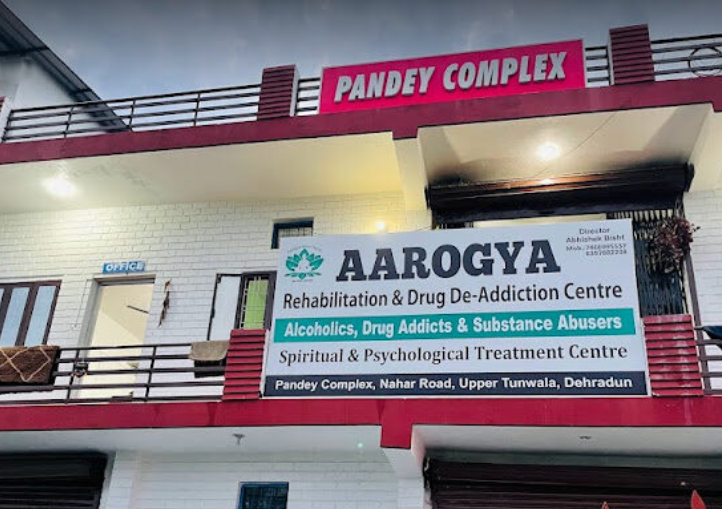Addiction is not just an individual problem—it affects families, friends, and the entire community. Recovery from addiction is a challenging journey, and while medical treatment and therapy are essential, the support of the community plays a crucial role in long-term success.
Community support in addiction recovery refers to the emotional, social, and practical assistance provided by friends, family, peers, and local organizations. When individuals struggling with addiction feel connected and supported, they are more likely to stay motivated, attend therapy sessions, and maintain sobriety.
At Aarogya Sewa Samiti, we emphasize the importance of community involvement in addiction recovery programs. In this article, we will explore how community support positively influences recovery, the ways it can be provided, and why it is essential for lasting sobriety.

1. Emotional Support from Family and Friends
One of the most significant aspects of community support in addiction recovery is emotional support. Family and close friends play a vital role by offering encouragement, understanding, and empathy.
People recovering from addiction often experience shame, guilt, and anxiety. Having a supportive community helps reduce these negative feelings and provides reassurance that they are not alone. Emotional support boosts confidence and encourages individuals to stay committed to their recovery journey.
2. Peer Support Groups
Peer support is another powerful component of community support in addiction recovery. Support groups bring together individuals who are experiencing similar struggles. Sharing stories, challenges, and successes creates a sense of belonging and accountability.
In these groups, participants learn from each other’s experiences and develop coping strategies. Peer support reduces feelings of isolation and motivates individuals to stay focused on their goals.
3. Encouragement to Attend Therapy and Programs
Community support can also encourage regular participation in therapy sessions, counseling, and rehabilitation programs. Individuals may feel reluctant or anxious about attending sessions, but encouragement from peers and family can make a big difference.
By promoting consistent attendance and engagement in treatment, community support in addiction recovery ensures that participants gain the full benefits of therapy, improving the likelihood of successful outcomes.
4. Practical Assistance in Daily Life
Recovery is not only about therapy sessions; it also involves managing everyday life without turning back to addictive substances. Communities can provide practical help, such as assisting with transportation to therapy sessions, helping with household responsibilities, or offering guidance in job searches.
This type of support reduces stress and allows individuals to focus more on their recovery. Practical assistance is an essential element of community support in addiction recovery because it removes barriers that could lead to relapse.

5. Creating a Safe and Positive Environment
A safe and positive environment is critical for recovery. Communities can influence recovery by creating spaces free from judgment, discrimination, and exposure to addictive substances.
When individuals feel accepted and valued in their community, they are less likely to engage in harmful behaviors. Community support in addiction recovery fosters a sense of security, which is essential for building confidence and emotional stability.
6. Awareness and Education Programs
Community involvement in addiction recovery also includes raising awareness and providing education about substance abuse. Local organizations, schools, and community groups can organize workshops and seminars to educate families and young people about addiction and recovery.
Such programs promote understanding, reduce stigma, and encourage more people to seek help. Awareness campaigns are an integral part of community support in addiction recovery because they create a knowledgeable and supportive environment for those in need.
7. Long-Term Accountability and Motivation
Recovery from addiction is a long-term process. Maintaining sobriety requires continuous effort and motivation. A supportive community provides accountability by checking in on progress, celebrating milestones, and gently reminding individuals of their goals.
Knowing that friends, family, and peers are watching and supporting their journey helps individuals stay focused. This continuous encouragement is a key element of community support in addiction recovery and is often a decisive factor in preventing relapse.
8. Reducing Stigma and Encouraging Open Conversations
Stigma surrounding addiction can prevent individuals from seeking help. Communities that promote open conversations about addiction and recovery help reduce this stigma.
By normalizing discussions about mental health and substance abuse, communities encourage individuals to seek treatment early. Community support in addiction recovery is most effective when people feel safe to talk about their struggles without fear of judgment.
9. Supporting Families of Addicted Individuals
Addiction affects families as much as the individual. Community support extends to family members by providing counseling, education, and peer groups for relatives.
Families who are informed and supported can better help their loved ones, manage stress, and rebuild relationships. This holistic approach strengthens the entire recovery ecosystem and enhances the effectiveness of community support in addiction recovery.
10. Role of Aarogya Sewa Samiti in Community Support
At Aarogya Sewa Samiti, we recognize that recovery is not a journey taken alone. Our programs integrate community support, peer groups, family counseling, and awareness campaigns to create a nurturing environment for participants.
We encourage families, local organizations, and peer groups to be actively involved in the recovery process. By combining professional treatment with strong community involvement, we ensure that participants receive comprehensive support that addresses both the psychological and social aspects of addiction.
Conclusion
Community support is a critical factor in addiction recovery. Emotional encouragement, peer support, practical assistance, safe environments, education, and long-term accountability all contribute to successful recovery outcomes. Community support in addiction recovery not only helps individuals maintain sobriety but also strengthens families and society as a whole.
At Aarogya Sewa Samiti, we focus on integrating community involvement into all our programs. For those seeking professional assistance, the best nasha mukti kendra in Dehradun offers expert guidance and a supportive environment where community, therapy, and care come together to ensure lasting recovery.
With a strong community behind them, individuals battling addiction can overcome challenges, rebuild their lives, and achieve a brighter, healthier future.
